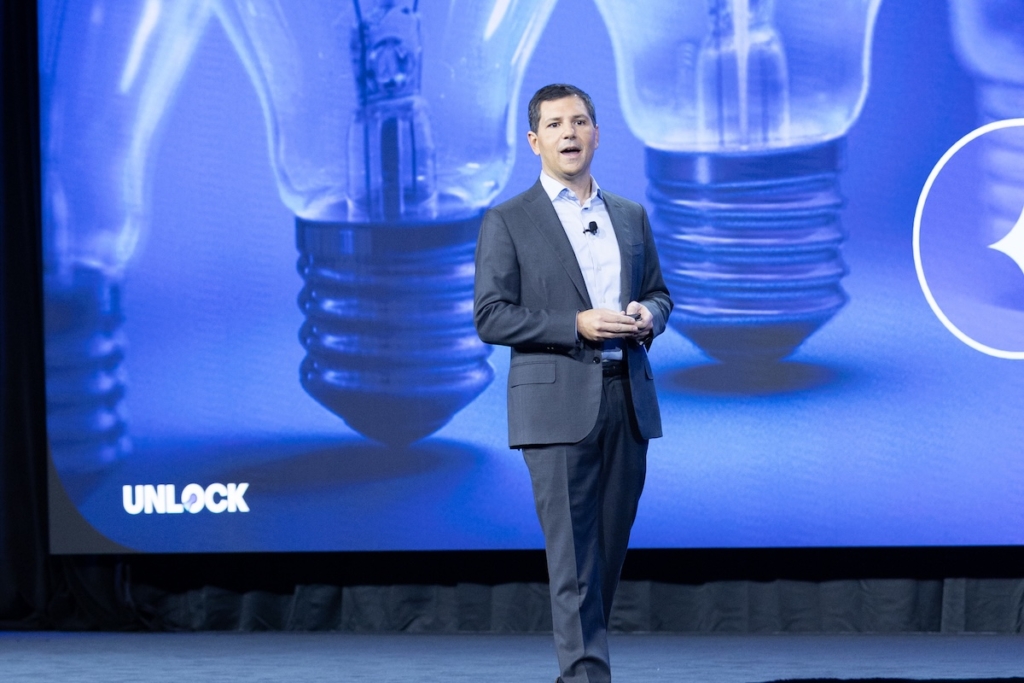At Unlock 2025, real estate professionals came together to explore how innovation, data and authentic connection are redefining the industry. The event focused on helping agents grow in a market driven by technology and changing client expectations.
Zillow leaders shared a unified message: The future belongs to professionals who use tech to spend less time on busy work and more time deepening connections with clients.
The event’s sessions offered actionable guidance for navigating this evolution. These five takeaways highlight the ideas that are shaping where real estate goes next.
1. Leadership and adaptability define the modern agent.
The real estate industry is changing quickly, and agents who stay adaptable are the ones who continue to grow. Zillow CEO Jeremy Wacksman reiterated Zillow’s mission to empower agents.
“Our role is to give you the software, the tools and the platform you need to meet the needs of consumers today and tomorrow,” he said. He described how Zillow Pro connects data, technology and community to help professionals thrive in any market, underscoring Zillow’s long-term focus on open access and transparency.
Errol Samuelson, Zillow’s chief industry development officer, expanded on that theme in his keynote about innovation. Drawing parallels to familiar products like wheeled luggage and mobile payments, he explained how true invention takes hold when it makes life easier and invites collaboration. He linked those principles to real estate, showing how AI and integrated tools are reshaping daily work.
“AI is going to be adopted faster than anything we’ve ever seen,” Samuelson said. “The tech is ready. Consumers are ready.… This is a seismic shift.” He also noted that most clients now expect digital options throughout their transaction, making efficient, tech-enabled workflows the new standard.
Key Insight: Leadership today means staying curious and open to change. Agents who use innovation to improve service will stay relevant as the industry continues to evolve.

2. AI is transforming client relationships.
Artificial intelligence was one of Unlock 2025’s most discussed topics. Cameron Swiggett, vice president of Product at Zillow, acknowledged the unease many feel about AI, but shared how agents can use it to supercharge their business. His approach to AI — delegate, automate, act smarter — shows how agents can hand off repetitive tasks, streamline workflows and use AI insights to show up at the right time with the right guidance for clients. Tools such as Zillow Pro, Follow Up Boss and Zillow Workspace help agents stay organized and unlock deeper insights so they can focus on strategy and building client trust.
Jimmy Miller, senior training and enablement manager at Follow Up Boss, demonstrated how AI tools are already built into agents’ everyday workflows. Simply using a Follow Up Boss phone number activates features that record, transcribe and summarize every call within seconds. The system then generates follow-up tasks, drafts messages and updates CRM records automatically — no setup or separate training required.
AI’s role is not to replace the agent’s judgment, but to handle the busywork that gets in the way of meaningful connection. As Swiggett noted, leveraging AI to help with repetitive tasks allows agents to deliver the human touch that only they can.
Key Insight: Smart automation frees agents to focus on people. When technology handles repetitive tasks, it makes room for the human connection to become stronger.
3. Data is the new differentiator.
Understanding and translating market data has become one of the most valuable skills for agents. Zillow Chief Economist Mischa Fisher shared insights into how affordability, job growth and inventory shifts are reshaping housing demand across the country. He explained that agents who turn these findings into clear stories for clients earn authority as trusted experts.
Amanda Pendleton, Zillow’s home trends expert, presented highlights from the 2025 Consumer Housing Trends Report that redefine how agents should think about today’s buyers and sellers. She debunked the idea that buyers have disappeared, noting that instead they have evolved; she then outlined three emerging personas shaping the market: Gen Z “curveball buyers,” experienced “comeback buyers” and increasingly data-driven “strategic sellers.”
- Gen Z buyers now represent 18% of the market, and they value authenticity, speed and digital access. Agents can reach them through a strong social presence, quick responses and optimized profiles that surface in AI-driven search.
- Repeat buyers make up 55% of transactions yet they show limited loyalty, with only 13% rehiring their previous agent. Reengagement campaigns, online visibility, and hands-on support with offers and logistics help retain this group.
- Strategic sellers now prioritize certainty and timing as much as price. One-third of these sellers list timeline as their top goal, and 42% offer concessions, such as covering closing costs or buying down rates to close faster.
Pendleton urged agents to modernize the way in which they connect with clients — by using digital tools, social media and authentic communication that builds trust.
Key Insight: Data becomes powerful when it’s personal. Agents who interpret the story behind the numbers can give their clients the confidence to act.

4. Build a brand that feels real.
A strong brand is no longer optional; it’s how agents stand out in a crowded, digital-first market. Beverly Jackson, vice president of Brand, Product and Integrated Marketing at Zillow, encouraged agents to define what their brand stands for before focusing on how it looks. Her recommended approach — clarity, consistency and credibility — helps agents build stronger, more authentic connections with clients.
“You are the brand, not the brokerage, not anyone else,” she said. “It’s you — your face, your personality, who you are, what you represent and how you show up. You are, in fact, that brand.”
Jackson emphasized that engagement beats reach. Show up with personality. Post reliably across the platforms where your clients live. Use Zillow Research, census data and local sources to tell local stories that prove you know the market. Let tools such as Showcase and Zillow Agent Profiles present a clear online identity. Then let AI support content creation and analytics so you can focus on storytelling and client guidance.
Key Insight: Purpose is the foundation of a brand. Agents who communicate values with clarity attract clients who share them.
5. Social media builds relationships, not just awareness.
Authentic connection now defines social success in real estate. David Lee of TikTok led a conversation with agents and content creators Breanna Banaciski and Cody Squires, who shared how authenticity and consistency help real estate professionals grow loyal audiences. They explained that vulnerability, humor and relatability drive engagement more than polish or production value.
The group encouraged professionals to experiment and use slow market periods to create content that educates or entertains. Banaciski and Squires both shared how showing personality, not just properties, helped them turn small followings into thriving communities. They emphasized that creativity is learned through practice, and that agents who put themselves in their videos humanize their brand long before a first meeting.
“If your content is not focused on you and creating your brand, then it’s not going to be memorable to people,” said Squires.
Panelists emphasized that video is now central to buyers and sellers discovering agents, and agents who consistently post genuine, engaging clips maintain visibility and trust through every market cycle.
Key Insight: Real connection drives conversion. Share stories, humor and perspective that show who you are — not just what you sell.
The future: Technology with intention
Unlock 2025 made it clear that the agents who win are the ones who never lose sight of the consumer. As Wacksman reminded attendees, “Technology doesn’t replace the human side of real estate. When technology comes to real estate, it elevates the human side of real estate.”
Zillow continues to invest in data, AI and connected tools that help agents build stronger businesses. The future of real estate will be shaped by those who use technology with purpose and lead with authenticity.